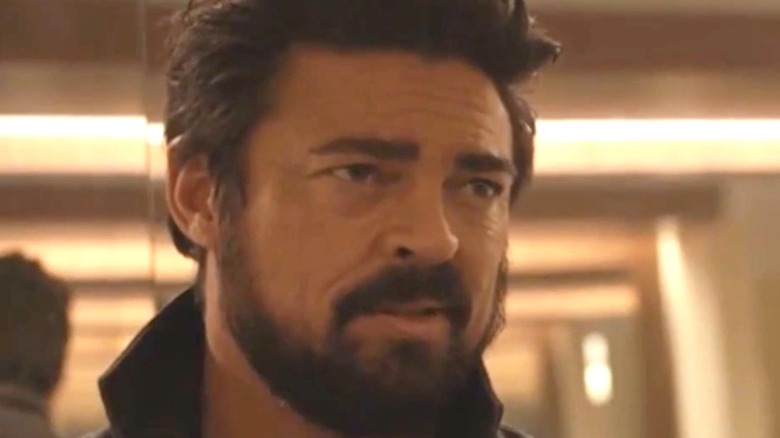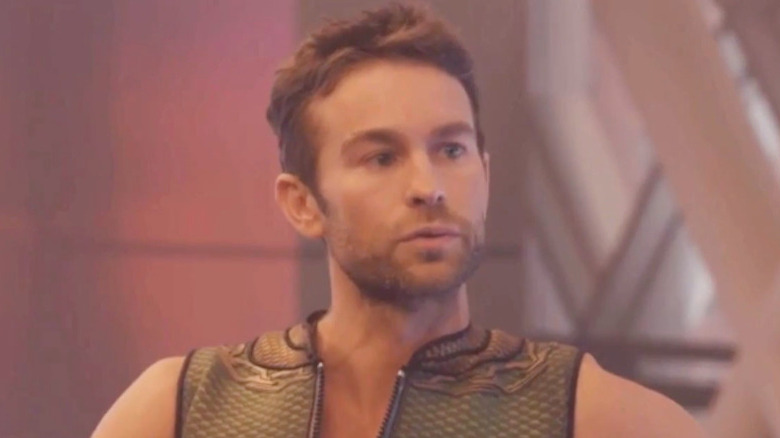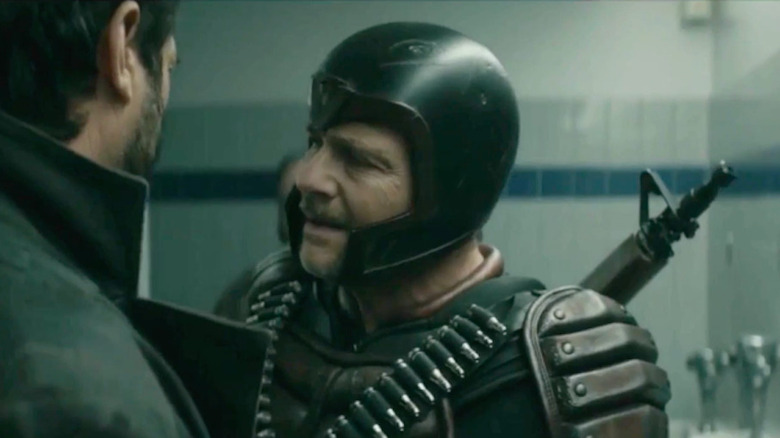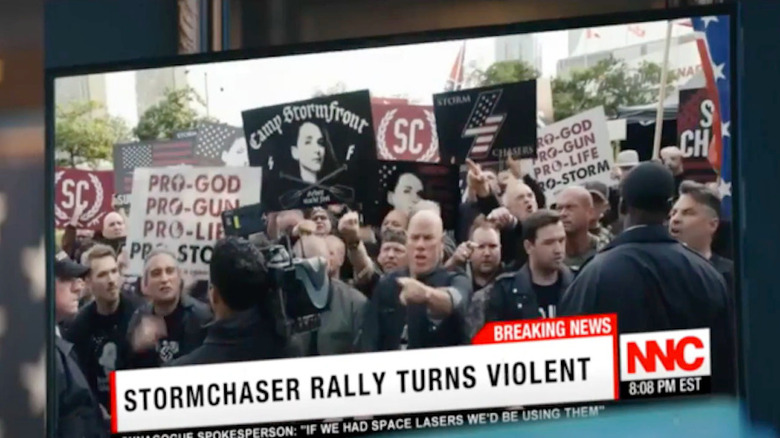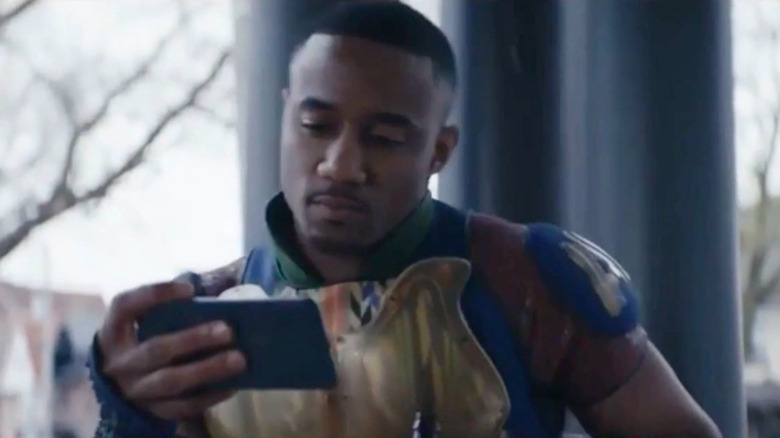The Boys' Brutal Satire Is Getting Even Sharper In Season 3
Contains spoilers for "The Boys" Season 3
"The Boys" is back and better than ever for Season 3, which features several newcomers, unexpected revelations, and plenty of twists and turns to keep viewers on their toes. One of the many reasons the series is intriguing is because it doesn't rely on the heartwarming messages of hope that provide the backbone of most superhero movies. Instead, the series subverts these sugary tropes in favor of analyzing what the world would look like if superheroes actually did exist, and it doesn't paint a pretty picture. Emboldened by inflated egos after years of public adoration, most superheroes are callous and apathetic individuals who commit heinous acts with their powers.
"The Boys" frequently parodies established comic book characters and their corresponding motifs, presenting a bold satirical commentary that's all at once revealing and inane. There aren't many shows that could feature a hero with a tentacle fetish in one scene and embark on criticism of ultimate power the next. While Seasons 1 and 2 lean heavily on themes like the toxicity of hero-worship, abuse of power, and consumer manipulation, the series is drawing more inspiration from real-world events this time around. Let's take a look at how the first three episodes weave reality into the narrative.
The Deep pulls a Leah Remini
Viewers will recall that Season 2 follows the Deep (Chace Crawford) as he becomes a member of the enigmatic Church of the Collective in a bid to improve his image and rejoin the Seven. After agreeing to an arranged marriage with his new wife, Cassandra (Katy Breier), the Deep decides to separate from the church with a dramatic exit. Now, he's making appearances on the talk show circuit to promote his tell-all book, titled "Deeper," which chronicles his daring escape from the church's sinister clutches, and doing Ted Talks about his harrowing experience. Vought television host Cameron Coleman (Matthew Eddison) even says that Vanity Fair has dubbed the Deep "the thinking person's superhero."
The storyline is an obvious reference to actor Leah Remini, who famously denounced the Church of Scientology in 2013 after being a member for more than 30 years (via Rolling Stone). Her memoir, "Troublemaker: Surviving Hollywood and Scientology," explores her religious journey and her criticism of the church's practices. She went on to host "Leah Remini: Scientology and the Aftermath," an Emmy award-winning documentary series that allows former Scientologists to tell their stories about the organization's abuse (via IMDb). Whistleblowing and suppression of the truth are major themes explored on "The Boys," so it's easy to see why a nod to Leah Remini's story would be included.
Gunpowder's firearm fanaticism
For a series that frequently showcases startling levels of absurdity, "The Boys" takes a more grounded approach to a serious topic that crops up in Episode 2, "The Only Man in the Sky." In order to find out what happened to Soldier Boy (Jensen Ackles), Butcher (Karl Urban) decides to pay a visit to the hero's old sidekick, Gunpowder (Sean Patrick Flanery). Butcher heads to a firearms convention, reminiscent of gatherings held by the National Rifle Association (NRA). Although Butcher typically tries to hide his weapons, his gun is welcomed in this environment, where children color under a cartoon bullet while their parents try out different munitions. Butcher can't help but roll his eyes and shake his head when he finds Gunpowder doing a seminar about constant vigilance against those conspiring to implement gun control.
There's no doubt that Butcher is as tough as they come, but it's almost like the character acts as a proxy for the show's creators in these scenes. As Butcher walks through the crowd, country music blaring over the speakers, he zeroes in on the children present. The sequence strikes a shockingly dark tone in the wake of the recent mass shootings in Buffalo, New York; Uvalde, Texas; and Tulsa, Oklahoma (via CNN). Although the characters on "The Boys" go up against antagonists with unimaginable powers like laser vision and super strength, the reality is that firearms pose a daily threat to public safety without stricter gun control (via Everytown).
Stormfront's ideologies prompt civil unrest
Season 2 did a great job of slowly revealing the truth about Stormfront. Her real identity is Klara Risinger, the wife of Frederick Vought and the first superhuman created by Compound V. The couple was deeply involved in the Nazi Party during World War II, and Stormfront eventually moved to America, where she reinvented herself as a B-list Supe named Liberty. Stormfront causes quite a stir when she first joins the Seven, gaining a significant social media following for her candid remarks about Vought. However, she quickly reveals herself to be a white supremacist with bigoted views against minorities and people without powers. Viewers were glad to see her vanquished by the season finale, although the ideas she leaves behind are still very present in the show.
While Stormfront lies practically comatose after getting burned to a crisp by Ryan (Cameron Crovetti), her followers are just as loyal as ever. A news report shows a group of people who call themselves "Stormchasers" at a violent rally in support of the former Nazi. These protesters, who are implied to hold Stormfront's fascist views, hold up signs that read "Pro-God, Pro-Gun, Pro-Life, Pro-Storm." The sight is eerily reminiscent of protests that have occurred following the reversal of Roe v. Wade (via The Guardian).
A-Train faces racist policing
While A-Train (Jessie T. Usher) callously causes Robin's (Jess Salgueiro) death in Season 1, at least he suffers the consequences of his actions. After abusing Compound V and having a heart attack, the speedster superhero can no longer run, so in Season 3, he decides to try to rebrand himself as a trailblazer in the Black community. When Vought doesn't go for it, he pays a visit to his brother, who reveals that a superhero named Blue Hawk (Nick Wechsler) has been over-policing Black communities, leading to a violent and unprovoked murder in their neighborhood.
One of the central themes of "The Boys" is the impact violence can have on a community, especially when it's caused by people who claim to serve and protect. In this case, it's superheroes, who run amok with minimal supervision and no consequences for their often devastating actions. The series delves even deeper into the parallel with A-Train's storyline, which forces him to confront racist policing methods in his hometown. Issues surrounding police brutality and racial inequality have been at the forefront of worldwide protests calling for reform in recent years, raising questions about systemic problems that have plagued the American justice system since its founding (via ACLU).
